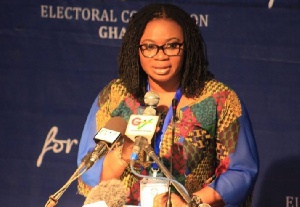Representatives of some minor political parties in Ghana have called on the Electoral Commission (EC) to soften its stance over a fiat to all parties to have physical offices in at least two-thirds of all districts in a region or risk being closed down.
The parties said the EC should take into consideration virtual offices as a result of technology and must not solely insist on physical ones.
“The EC should engage in extensive consultations and dialogue with the political parties and the general public on the best way forward such that its decision after the 31st May 2016 deadline would strengthen the inclusive nature of Ghana’s multiparty democracy and not undermine it,” the parties said in a communique after a two-day agenda-setting meeting organized by IDEG.
The Election Management Body has directed all political parties to comply with Article 55(7b) of the Political Parties Law 2000 which stipulates that parties must be organized in not less than two-thirds of all districts in Ghana.
According to the parties, the interpretation of the Article to “mean that they should have physical offices in two-thirds of the districts in every region seems not to take into account other forms of organising more effectively.
“Social media and web-based virtual offices are now being used extensively by corporate organisations, virtual universities and State institutions like the EC to make decisions and deliver public services. Increasingly, civil society organisations are also using similar modern technology and social media to organise and mobilise citizens to participate in decision-making democratically.”
The parties which include the Convention People’s Party (CPP), Great Consolidated Popular Party (GCPP), National Democratic Party (NDP), Progressive People’s Party (PPP), Democratic People’s Party (DPP), Independent People’s Party (IPP) and the United Front Party (UFP) said, the EC has overlooked the “importance of social media and web-based virtual offices to the cost effective operations of political parties today.”
“Therefore, if the EC were to enforce this particular provision without taking into account the use of modern technology to enhance the organizational activities of the political parties then it would be undermining the operational effectiveness and democratic aspirations, particularly of the small under-resourced parties in the multiparty democratic system,” the communique added.
They also decried the “lack of political space” to enable them to effectively participate in building democracy.
At the end of the two-day event, they also discussed: “Lack of political space for the participation of small political parties as a result of the ‘winner-takes-all’ system of government, which entrenches the politics of exclusion.
“The inherent structural weakness of Ghana’s multiparty system and the virtual emergence of a two-party system that prevents small political parties from effective participation in the governance process.
“Reforming the decentralized local government structures in a way that allows political parties to contest elections at the district level too.
“Monetization of politics and vote-buying that further cripples and weakens small political parties and building trust among small political parties as a way of leveraging on their collective strengths.”
General News of Tuesday, 24 May 2016
Source: starrfmonline.com

















